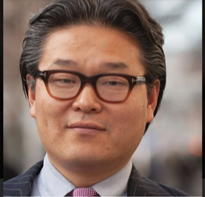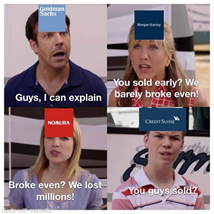Posted November 21, 2024
By Sean Ring
Hwanging for 18 Years
When I read in The Wall Street Journal that Bill Hwang, lately of Archegos, got 18 years in prison for his fraud, a wave of emotions overcame me. No, I don’t care that Bill was sentenced, as he deserves it. But he won’t be thrown into general population at a maximum security prison, and he’ll almost certainly not serve the entire sentence anyway, as he’s 60 years old.
I’m emotional because 3 ½ years ago, one of my first ever Rude Awakening pieces was called “Credit Suisse Hwangs Itself.” That detailed the fraud unraveling, one step leading to the bank’s downfall and takeover by UBS.
I realize newer subscribers probably don’t know much about my career, and why should they? I haven’t written about it as much. But it’s an excellent opportunity for them to get better acquainted with where I came from in banking. If you’re one of those subscribers, I hope you enjoy my highly edited, newer version of that piece. If you’ve been with me for a while, let’s go back together to tell an old story…
Credit Suisse Hwangs Itself
“Oops, I did it again,” sang Britney Spears.
Credit Suisse should’ve adopted it as their theme song. My old bank always had a death wish. In April 2021, Bill Hwang’s Archegos fund blowup cost them $5.5 billion (yes, with a “b”). But before we get sucked in, let’s note that UBS (Used to Be Smart) lost $774m as well. Sorry, I just wanted to play fair.
As my friend, a Goldman Sachs partner, WhatsApped me, “… your previous organization seems to be in perpetual trouble – with the management, espionage, risk management, dodgy people… makes for an entertaining read of the weekend FT!”
Let’s not rehash everything the bank did to destroy itself over the past two decades. We can start in 2015 with the appointment of Tidjane Thiam. Thiam was supposed to be a savior after Brady Dougan’s volatile reign.
The Entrepreneur’s Bank
Thiam, an old McKinsey man (Shields Up! Red Alert!), took the bank away from its recent trading makeover and turned it into a vast wealth management house. But that wasn’t the only thing. His idea - funnily enough, following UBS’s steps - was to meld the investment bank and private bank into a cross-selling “entrepreneur’s bank.”
On the face of it, it’s a great idea. Say the investment bank is covering a corporation that’s about to IPO. The founders would experience a “liquidity event.” That’s banker-speak for “those dudes are about to get very rich.” Thiam mandated that the investment bankers covering that corporation must introduce its founders to one of Credit Suisse’s private bankers.
Likewise, if a private banker managing a high-net-worth individual’s money realizes the HNWI’s company needs advisory or financing, he’s supposed to introduce the HNWI to an investment banker.
This works incredibly well in Asia, where the money is much newer than, say, in Europe, where most of the wealth is inherited.
Some of you who worked for banks may recall that private bankers and investment bankers rarely speak to each other – especially about business – so this was a new way of doing things.
For those who haven’t, investment bankers think private bankers can’t even model a company. Private bankers think models are the people who answer the phones in their offices.
Long story short: the private/investment bank combo led to a massive over-concentration of risk.
But before we even get into that, let me get James Bond on your ass.
I Spy with My Little Eye… a new UBS Employee?
Iqbal Khan’s story is fabulous. Ambitious, hardworking, and annoyingly handsome, Khan rose through Ernst & Young’s Swiss arm’s ranks to become its youngest-ever partner. Later, at only 40, he left there for Credit Suisse to become the Head of International Wealth Management.
Tidjane Thiam was impressed. And then, rather incredibly, Khan moved right next door to him.
“To me, moving in next door like that, there are two signals you might be wanting to send,” says one Credit Suisse executive. “Either: ‘We get along so well I’d like to spend more time near you,’ or else: ‘I’m coming for you.’”
Well, Khan did come… for Thiam’s hedges! Ludicrously, the two fell out over the home improvements Khan was making to his house. It wrecked Thiam’s view, and the noise was unbearable.
No, I’m not making this up.
So Khan wound up resigning and going to UBS, Credit Suisse’s larger rival and next-door neighbor. Thiam was so furious and worried that he hired a private investigator to follow Khan.
Really.
Unfortunately for Thiam, this PI was more Johnny English than Philip Marlowe. Khan realized he was being followed and went to the police. Thiam was embarrassed and, a few months later, was out the door himself.
Greensill Capital
Next up is Lex Greensill and his supply chain finance company.
According to its court filings, Greensill had three main businesses: supply chain financing, accounts receivables financing (also known as “factoring”), and a practice Greensill called “future accounts receivables finance.”
Future accounts receivables? What the hell are future accounts receivable?
Credit Suisse lent to them on the back of that. Now, it’s in the hole for $90 million of the $140 million it loaned to them. Not only that, but clients are screaming for Credit Suisse to make good on the supply chain funds CS sold them that were described as “safe.”
Get this: The bank’s risk management team rejected those loans, but upper management stepped in to approve the loans because Lex Greensill was also a private banking client. That’s concentration risk in a nutshell.
What’s a Nice Guy From Tenafly Doing in a Place Like This?
Bill Hwang, of Tenafly, NJ - of all places! - is a story of ambition overtaking reason. He was a protégé of the great Julian Robertson. Upon Robertson shuttering Tiger Management, he seeded Hwang $25 million to run Tiger Asia. Hwang grew the fund to over $5 billion at its peak.
But in 2012, Tiger Asia Management admitted to insider trading and paid more than $60 million in fines. In 2013, Hwang turned Tiger into a family office called Archegos. That way, his trading would be less regulated than if he remained a hedge fund. In 2014, in Hong Kong, Hwang was banned from trading for four years.
It’s as if Chemical Ali was Hwang’s PR officer: “There’s nothing to see here!”
Despite that, Goldman Sachs, Morgan Stanley, Nomura, and Credit Suisse continued to fund Hwang’s excessively levered family office.
Archegos was reportedly worth between $10-15 billion with 5x leverage. That is, Archegos used that $10-15 billion to trade $50-75 billion worth of stock. It was also a highly concentrated fund.
How did they do that?
Total return swaps.
These swaps allow the fund to earn the equity return on the securities it wants, but it doesn’t have to file a 13F disclosing those positions… because the fund doesn’t own the stock. (The banks do and pass on the equity return to the fund.) Of course, this goes south once the equities fall, as they did for Archegos.
Why on earth would Credit Suisse take this risk?
Because Hwang was a private banking client, as well.
More concentration risk.
As one of my old trader buddies from Barclays WhatsApped me, “Tiger Asia was one of my clients. I’m amazed the PB did business with him again.”
Credit Suisse’s Lara Warner, the Head of Risk and Compliance, and Brian Chin, the Head of the Investment Bank, were relieved of their duties soon after.
At the time, I thought more people should have been fired. With the then-zero interest rates, it took a stupid amount of risk for something to blow up. There’s simply no penalty to pay when you can roll over your financing at zero cost in perpetuity.
I don’t hate bank stocks because of their earnings volatility or razor-thin net interest margins. I hate them because the tops of the houses are rotten.
I’m convinced some scribe screwed up a few thousand years ago. Money isn’t the root of all evil. Money printing is.
As seen on LinkedIn:
Q: On a scale of 1-10, how levered are you?
A:

Also:

And finally, from an Australian star trader:
“Hwanged (verb): To suffer a permanent loss of capital as a result of extending excessive and imprudent leverage to someone who has been found guilty of securities fraud.
‘I’m stuck in the office bro. Risk are making me review all my credit lines. The bank doesn’t want to get Hwanged.’”
Hilariously, a comment from a Hong Kong trader follows:
“BTW, In Cantonese, when you say something is hwang (meaning yellowed), it means destroyed, lost, so your verb of Hwanged actually means something in Cantonese Hong Kong.”
Tower of Babel be damned. We all speak the same language on the way down!
Wrap Up
I hope you enjoyed our little history lesson. It’s now wrapped with a neat bow, as Hwang will enter prison for his crimes.
Our course, Credit Suisse was subsumed into UBS in a hastily arranged marriage. But that’s the genius of capitalism. Bad companies go the way of the dodo.

L'oro dell'Italia
Posted December 05, 2025
By Sean Ring

The Border Threat No One Saw Coming
Posted December 04, 2025
By Sean Ring

Beating Inflation by Following the Trend
Posted December 03, 2025
By Sean Ring

The Curious Case of the Disappearing Silver
Posted December 02, 2025
By Sean Ring

Silver Surfing... and Bonus Tickers!
Posted December 01, 2025
By Sean Ring

